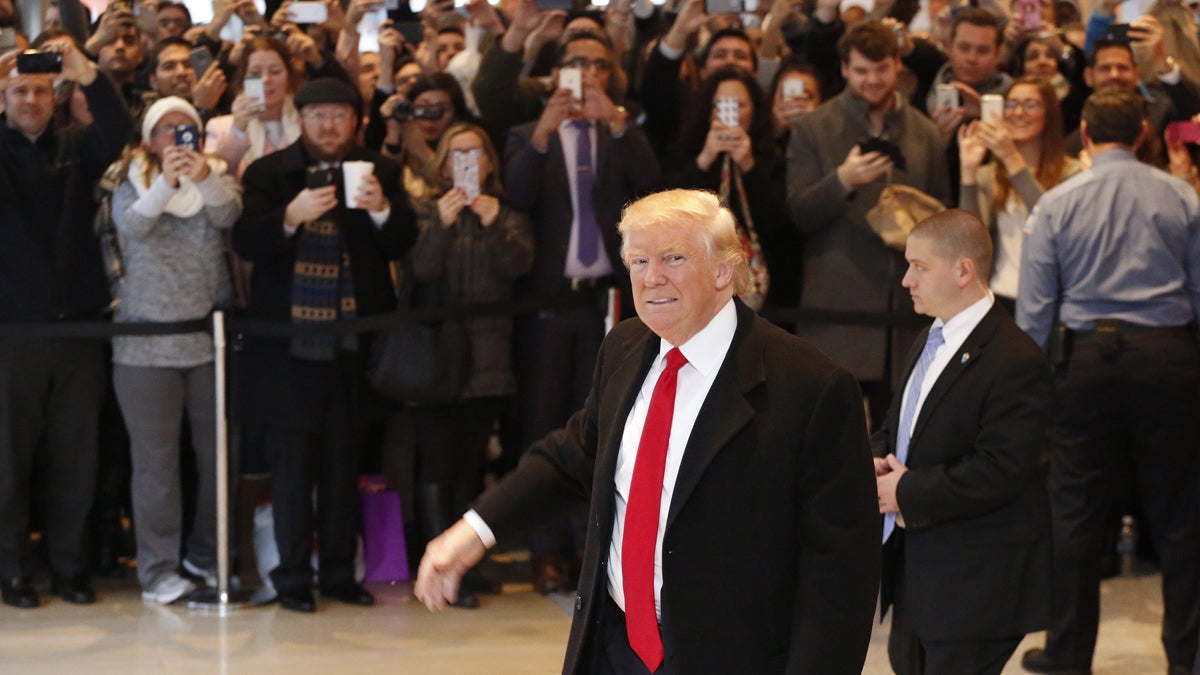Letter: Trump must condemn campus attacks so we can move across political divide

President-elect Donald Trump walks past a crowd as he leaves the New York Times building following a meeting
I am writing to urge you to denounce the recent racist attacks at the University of Pennsylvania. By condemning the recent spate of campus attacks, you will make it easier for all of us to talk across our political differences.
Dear President-elect Trump:
I am writing to urge you to denounce the recent racist attacks at your alma mater, the University of Pennsylvania, and on other campuses around the country.
I know that you disavowed white nationalists during your interview last Tuesday at the New York Times. But our students need something more.
And they’re unlikely to get it from the open letter that my Penn colleagues sent to you on Nov. 11. Signed by more than 450 professors, it asked you to condemn a vicious message that was emailed to our African-American freshmen. Invoking images of lynching, the email also mentioned your name several times; indeed, its anonymous authors identified themselves as “Big Daddy Trump.”
But I refused to add my own name to the professors’ letter, which used the email assault to launch a gratuitous attack on you. Like so much in our post-election discourse, it seemed designed to let off steam — and to punish an enemy — rather than to repair the frayed political climate on our campuses.
“We remember that … you named far-right extremists as advisers to your campaign;” the letter declared, “that in your campaign rallies and from your Twitter feed, you repeatedly circulated and amplified racism, sexism, anti-Semitism; that you gave press credentials to a white supremacist radio host; and that you refused to denounce the neo-Nazi David Duke’s endorsement of your campaign for many months.”
Mr. Trump, I would be lying if I said I didn’t share these concerns. But it also doesn’t take a graduate of Penn’s Wharton School — where you received your degree — to know that recounting someone’s previous sins is a poor first gambit in any negotiation. I’m baffled that my colleagues would include them in a letter ostensibly seeking your cooperation, especially on a matter of such primal importance to our students.
I know that many of these same professors believe that the students should have the chance to express their anger about the election and about the burst of racist behavior that followed it. In the open letter, however, the professors put their own anger ahead of their students’ best interests. The needlessly antagonistic tone of the letter pretty much insured that you would ignore it.
But our students are still scared, and with good reason. At Villanova, just a few miles from Penn, a black student was knocked to the ground by three white men who yelled your name. At Wellesley College, alma mater of Hillary Clinton, two students from nearby Babson College entered campus in a pickup truck adorned with a large Trump flag, parked it outside a meeting house for African-Americans, and spat on a black student.
And at Texas State University in San Marcos, an anonymously distributed flier threatened violence against people who favor diversity and multiculturalism. “Now that our man Trump is elected,” the flier warned, “Time to organize tar and feather vigilante squads and go arrest and torture those deviant university leaders spouting off that diversity garbage.”
In my heart, Mr. Trump, I believe that neither you nor most of your supporters embrace these racist attacks. But many of our students — especially our students of color — think otherwise. Their hearts are broken, Mr. Trump, because they think you have made it safe for your followers to revile them.
A simple disavowal would go a long way towards alleviating their fears. In your Times interview, you firmly distanced yourself from white nationalists who used anti-Semitic and racist rhetoric at a recent Washington, D.C., conference. “I don’t want to energize that group, and I disavow that group,” you said. Why not say the same thing about racists on campus, so our students know where you stand?
It would also help those of us who have been pleading for a more complete and honest discussion about the election and its results. Too many students and faculty insist that your campaign was founded purely on racism, and that anyone who voted for you is likewise tinged with prejudice. And there’s no way to conduct a reasonable discussion with a racist, who by definition lives beyond reason.
Again, Mr. Trump, I think you could counter that viewpoint by condemning the recent spate of campus attacks. Some people will continue to claim that you and your supporters are incorrigible bigots, of course. But it will be harder for them to make their case once you have distanced yourself from the hatred being expressed in your name.
And it will be easier for all of us to talk across our political differences, which is the hardest thing to do right now. I’m sorry that my colleagues took superfluous potshots at you in their open letter, closing off the possibility of a real conversation. But I still think we can conduct one, so long as you clearly and unequivocally condemn racists on campus. I urge you to do so.
—
Jonathan Zimmerman teaches education and history at the University of Pennsylvania. He is the author of “Campus Politics: What Everyone Needs to Know” (Oxford University Press)
WHYY is your source for fact-based, in-depth journalism and information. As a nonprofit organization, we rely on financial support from readers like you. Please give today.

